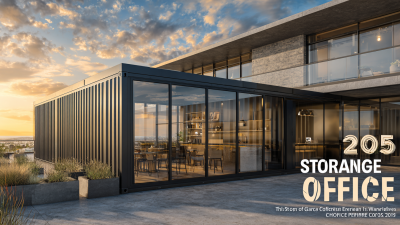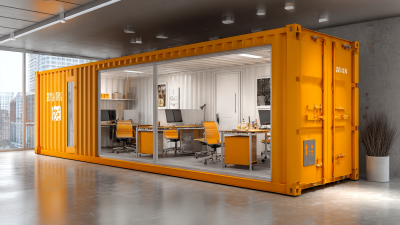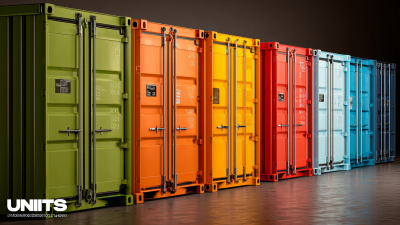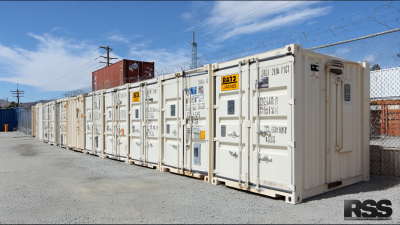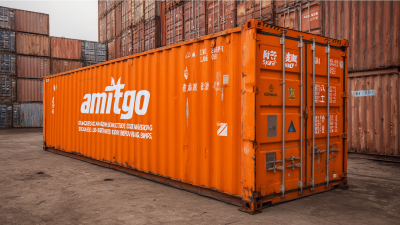In today's fast-paced business world, the need for cost-effective and versatile workspace solutions has never been more critical. Enter the Shipping Container Office, a remarkable innovation that combines functionality with a sustainable approach to modern business needs. These repurposed containers not only provide a unique aesthetic appeal but also offer an array of advantages that traditional office spaces simply cannot match. From affordability to mobility, and sustainability to customization, the benefits of choosing a Shipping Container Office are substantial. In this blog, we will explore seven unbeatable reasons why your business should consider making the switch, highlighting how this emerging trend aligns with the evolving demands of today’s workforce while promoting environmental responsibility. Whether you're a startup looking to save costs or an established company seeking flexible expansions, a Shipping Container Office could be the perfect solution for your workspace challenges.

The trend of using shipping containers as office spaces is rapidly gaining traction, and for good reason. These innovative structures offer a myriad of benefits that can greatly enhance your business operations. One of the most significant advantages is their sustainability. Shipping container offices are repurposed from waste materials, promoting a greener approach to construction. This not only reduces environmental impact but also positions your brand as eco-conscious—an attractive quality for today’s consumers.
Additionally, shipping container offices are cost-effective solutions. They require less construction time and labor compared to traditional buildings, allowing businesses to save on overhead costs. The growing acceptance of container architecture in various projects, such as portable pavilions and vibrant office buildings, reflects a shift towards modern, flexible working environments.
Tips: When considering a shipping container office, ensure proper insulation and ventilation for comfort year-round. Also, be mindful of your container’s layout to maximize usable space. Finally, check local building codes and regulations to ensure a smooth approval process for your unique office setup.

When considering office space solutions, cost-effectiveness often tops the list of decision-making factors. Shipping container offices have emerged as a popular alternative due to their affordability and versatility, offering businesses significant savings compared to traditional office structures. According to a report by Grand View Research, the global modular construction market, encompassing shipping container buildings, is projected to reach $157.2 billion by 2027, highlighting the rising acceptance of these innovative spaces.

One of the most compelling financial benefits of shipping container offices is their lower initial investment. Traditional office spaces can incur costs upwards of $200 per square foot for construction, while container offices can be built for as little as $50 to $150 per square foot, depending on customizations. Additionally, operating costs are often reduced due to the energy-efficient qualities of these containers, which can result in up to 30% lower utility bills, as noted in a study by the U.S. Department of Energy. This substantial difference in investment and operational expenses makes shipping container offices an unbeatable choice for startups and established businesses looking to maximize their budgets while maintaining functionality and style.
In an evolving business landscape, flexibility and customization are paramount for creating a workspace that meets the diverse needs of companies. One innovative solution gaining traction is the shipping container office, which offers an adaptable environment for businesses of all sizes. The global flexible workspace market is projected to grow from $45.24 billion in 2025 to $136.46 billion by 2032, showcasing a robust compound annual growth rate of 17.08%. This trend underscores the rising demand for office solutions that can be tailored to unique operational requirements.
Shipping container offices are designed to be highly customizable. They can be reconfigured or expanded easily as business needs change, allowing companies to scale their operations without the constraints of traditional office buildings. Furthermore, these offices can be equipped with various amenities and layouts, ranging from collaborative spaces to private workstations. As organizations increasingly prioritize employee well-being and productivity, the adoption of flexible office solutions, like shipping containers, reflects a significant shift in how businesses approach workspace design. Embracing this trend not only enhances functionality but also aligns with the modern workforce's expectations for dynamic work environments.
Shipping container offices have emerged as an innovative solution for businesses looking to minimize their environmental impact. The environmental advantages of container offices are numerous, making them a sustainable choice for modern enterprises. According to a report by the World Green Building Council, green buildings can reduce carbon emissions by up to 40%. By repurposing shipping containers, companies can avoid the resources that would typically go into constructing traditional buildings, thereby significantly decreasing their carbon footprint.
Utilizing shipping containers not only cuts down on waste but also promotes efficient resource use. Research indicates that the construction sector contributes to nearly 39% of global carbon emissions. Switching to container offices helps businesses align with sustainable practices and meet contemporary regulatory standards. Moreover, the insulation properties of containers can lead to reduced energy consumption for heating and cooling, showcasing another facet of their eco-friendliness.
Tip: Consider integrating solar panels on your container office to harness renewable energy. This can significantly reduce operational costs while enhancing your commitment to sustainability. Additionally, using recycled materials for interior furnishings can further promote a green business ethos. Embracing these practices can lead to a more sustainable and cost-effective workspace.
Shipping container offices have gained popularity due to their unparalleled mobility and versatility, making them an innovative choice for businesses of all sizes. According to a report by the World Economic Forum, the global market for portable and modular buildings is projected to reach $157 billion by 2025, with a significant chunk attributed to shipping container solutions. These structures allow businesses to easily relocate their office space without the extensive costs and delays associated with traditional construction methods.
The adaptability of shipping container offices enables companies to set up shop in remote areas or bustling urban centers, thereby capitalizing on emerging markets or meeting project demands. Research from the Modular Building Institute indicates that modular constructions can be up to 50% faster to deploy compared to conventional buildings, which is crucial for businesses needing to respond quickly to market changes. Furthermore, the ability to stack containers or reconfigure them according to specific project needs only enhances their utility, allowing businesses to create a customized workspace that evolves as their operational requirements change.
